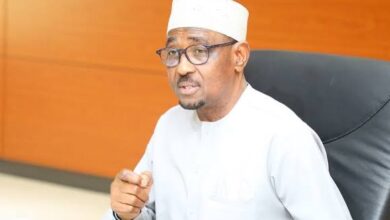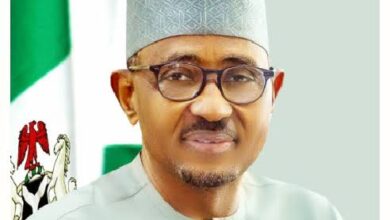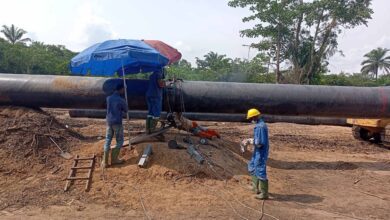Nigeria To Increase Capacity In Oil, Gas, Power Generation -Osinbajo

Nigeria’s Vice President, Prof. Yemi Osinbajo has restated the commitment of the present administration of President Muhammadu Buhari to increase capacity in oil, gas and power generation.
Prof. Osinbajo stated this today while declaring opened the 14th Annual International Conference of Nigerian Association for Energy Economics (NAEE)/ International Association for Energy Economics (IAEE) currently holding at the PTDF Building in Abuja.
The theme of the Conference is: “Strategic Responses of the Energy Sector to COVID-19 and the Impact on African Economies”.
Osinbajo said, the administration has birthed key initiatives, especially the NLNG Train 7, FID that would lead to an increase capacity of up to 30 percent at bonny Island in Lagos that would keep Nigeria at the forefront of leaders in Liquified Natural Gas globally.
The VP said the continued progress on the $2.6 billion AKK pipeline would allow closer integration of energy access across the country and increase the number of gas based industries across the country.
He noted that “as the sixth largest gas country and ninth in gas export, Nigeria needs to consume more gas to energise our economy”.
He said, the passage of the Petroleum Industry Bill (PIB) by the National Assembly, advanced work at Dangote refinery and ongoing rehabilitation of P/Harcourt refinery would position the country for self sustainability in refined product.
Represented by the Special adviser to President on Infrastructure, Ahmad Zakari, Osinbajo said, efforts are also being made to stabilise the power sector.
The VP said, electricity tariff reforms and service-based tariff has increased revenue collection in the sector by 63 percent, thereby increasing revenue to gas producers and stabilising the value chain.
“Electricity Tariff Reforms with the Service Based Tariff that have increased collections from the electricity sector by 63%, increasing revenue assurance for gas producers and stabilizing the value chain … it is anticipated that all electricity market revenues will be obtained from the market with limited subsidies as reforms in metering and efficiency with the DISCOs continue to improve.
“Accelerated investment in Transmission and Distribution (over $3 billion) Infrastructure that will put Nigeria on a path to 10GW+ and beyond … through interventions with the Central Bank of Nigeria, the Siemens partnership, the World Bank and African Development Bank, JICA, AFD and others”, he said.
He lauded the NAEE’s capacity to bring together the academia, policy makers, government’s Ministries, Departments and Agencies (MDAs) and businessowners, all in one place to discuss the challenges and opportunities of the energy industry in Nigeria.
“Judging from the lineup of academics, experts and business leaders at this event, I have no doubt that we are on the cusp of learning new, innovative ways through which the energy sector can respond to Covid-19 and other challenges”, he said.
Also speaking, the President NAEE, Prof. Yinka Omorogbe said, at a time when the world, especially the third world countries are ravaged by the COVID-19 pandemic, there was need for cross fertilisation of ideas in order to change the narrative.
“Global coronavirus pandemic has continued to ravage the world since early 2020. It has become the world’s greatest challenge, exacerbating global poverty but serving to emphasize that there was now the need for radical change.
“An estimated 689 million people, comprising approximately roughly 9% of the global population, were estimated to live in in extreme poverty in 2020.
“70% of these persons are in Africa and a hundred million of these are in Nigeria. It has recently taken over from India as the Poverty Capital of the world, with the unenviable position of being the country with about 90 million people living in extreme poverty.
“Into this daunting mix, there is now the International Energy Agency’s extremely ambitious net zero carbon economy target to contend with.
“For African countries, which have the problem of low levels of access to modern energy services, and which have no option but to grow their energy industries, this presents a very interesting and- to me- exciting challenge.
Africa abounds in energy resources- coal, bitumen, crude oil, natural gas, solar energy, wind, tidal and wave energy, geothermal energy etc. The continent is blessed! Unfortunately these resources have so far not been harnessed so as to unlock their vast potentials for the use of the people.
“Again unfortunately, Nigeria has not only come to epitomise the paradox of poverty in the midst of plenty in the energy sector, but also has the strange revenue-draining paradox of being both a major exporter of crude oil and a major importer of petroleum products which are subsidized at a cost that the nation cannot afford. This does not augur well in this time and season. The primary promise on the horizon is the Petroleum Industry Bill, which one hopes will soon be assented to by the President”, she said.
Earlier, the Executive Secretary, Petroleum Technology Development Fund (PTDF), Dr Bello Gusau said, in Nigeria, where the oil sector accounts for half of the government’s revenue and 90 percent of foreign exchange earnings, GDP growth for oil has not been recovering as expected, a trend, he said, could potentially have a negative implications for quick economic recovery in a post COVID-19 era.
He however, expressed confidence that the PIB would create a suitable fiscal regime and business environment that will incentivise and attract foreign investment.
On capacity building as a response, he said, the PTDF would always be available to support the industry.






